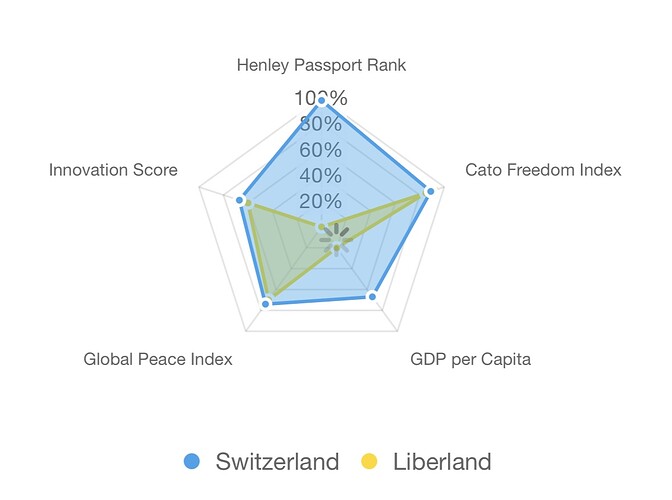Article 4 of Liberland vs The World
Liberland vs. Switzerland: Neutrality and Direct Democracy in the Heart of Europe
The Alps have long symbolized resilience and independence, cradling a nation that punches well above their weight: Switzerland, a 41,285-square-kilometer confederation of 8.7 million people, renowned for its armed neutrality and direct democracy. Enter Liberland, a 7-square-kilometer libertarian enclave founded in 2015 by Vít Jedlička on a disputed Danube plot. Inspired by Monaco’s elite citizenship, Liberland pairs a small, merit-based physical citizenry (~3,000-10,000 target) with ~800,000 citizenship applicants, offering tax-free digital services and blockchain voting. Yet, as an unrecognized micronation under Croatia’s control, Liberland seeks legitimacy through innovative governance. Can Switzerland’s path from medieval confederacy to UN member in 2002, built on neutrality and citizen referendums, guide Liberland’s quest? In this fourth installment of Liberland vs. the World, we compare their journeys across eight pillars, revealing how Switzerland’s balanced recognition strategy could inspire Liberland’s libertarian vision.
Historical Origins: Confederacy vs. Frontier
Switzerland’s origins trace to 1291, when three cantons formed a defensive league against Habsburg rule, evolving into a confederation recognized at the 1815 Congress of Vienna through neutrality and federalism. It joined the UN in 2002 after a referendum, with ~100 bilateral treaties (UNTC data) underscoring its diplomatic prowess. Liberland, declared on terra nullius in 2015 amid Croatia-Serbia border disputes, claims statehood under the Montevideo Convention but lacks UN recognition, with five MOUs (e.g., Somaliland, Haiti). Switzerland’s referendum-driven recognition suggests Liberland could use blockchain votes to affirm symbolic commitments, fostering legitimacy through citizen-led processes.
Metric Snapshot:
• Year of Establishment: Switzerland 1291 (confederation 1848); Liberland 2015.
• UN Membership: Switzerland 2002; Liberland N/A.
• Bilateral Treaties: Switzerland ~100; Liberland 5 MOUs.
Citizenship: Inclusive vs. Scalable
Switzerland’s citizenship, governed by the 2014 Citizenship Act, allows dual citizenship and offers paths by descent, birth, marriage (3 years), or naturalization (10 years residency, integration test). With ~8.7 million citizens, it emphasizes inclusivity. Liberland’s dual model features ~1,200 full citizens (merit-based, 5,000+ Liberland Merits via contributions) and ~700,000 e-residents (open to libertarian supporters, ~$5,000-$10,000 fee), allowing dual citizenship. Switzerland’s 1:1 population-to-citizen ratio contrasts Liberland’s 583:1, suggesting Liberland could expand e-residency to mirror Switzerland’s inclusive integration while maintaining elite exclusivity.
Metric Snapshot (Henley Passport Index 2025, World Bank):
• Population vs. Citizens: Switzerland 8.7M/8.7M; Liberland 800,000/1,200.
• Passport Rank: Switzerland ~4th (185 visa-free); Liberland N/A (Somaliland MOU).
• Dual Citizenship: Switzerland Yes; Liberland Yes.
Governance and Economy: Federalism vs. Virtualism
Switzerland’s federal republic, with seven-member executive (Federal Council) and direct democracy (600+ referendums since 1848), drives a $900 billion GDP (World Bank, 2025) via banking and pharma, with a Cato Human Freedom Index score of ~8.9. Liberland’s presidential republic with blockchain voting (10% quorum) and virtual economy (e-residency fees, Liberland Merit/LLM cryptocurrency) also avoids taxes but lacks physical infrastructure. Switzerland’s decentralized cantons suggest Liberland could enhance blockchain governance to attract diaspora investments, like Serbia’s Ark Village.
Metric Snapshot (Cato Human Freedom Index 2023, World Bank):
• Freedom Index: Switzerland ~8.9; Liberland ~8.5 (estimated).
• GDP per Capita: Switzerland ~$100,000; Liberland N/A (virtual potential).
• Tax Burden: Switzerland 28% of GDP; Liberland 0%.
Culture and Society: Multilingual vs. Globalism
Switzerland’s four official languages and multicultural cantons (German, French, Italian, Romansh) foster a tolerant society, with ~25% foreign-born residents. Liberland’s e-residency creates a diverse, libertarian community of “live and let live.” Switzerland’s cultural harmony suggests Liberland could promote its ethos to attract global talent via diaspora villages like Ark Village.
Metric Snapshot (Global Peace Index 2025):
• Peacefulness: Switzerland ~1.1; Liberland ~1.5 (estimated).
• UNESCO Sites: Switzerland 14; Liberland 0.
Innovation and Technology: Precision vs. Blockchain
Switzerland ranks 1st on the Global Innovation Index (2024), with strengths in R&D (~3% of GDP) and IMD Competitiveness (~2nd, 2025). Liberland’s blockchain e-residency leads (estimated ~60/100). Switzerland’s precision engineering suggests Liberland could scale blockchain for global digital services.
Metric Snapshot (Global Innovation Index 2024):
• Innovation Score: Switzerland ~68; Liberland ~60 (estimated).
• IMD Competitiveness Rank: Switzerland ~2; Liberland ~50 (estimated).
Military and Neutrality: Armed vs. Principle
Switzerland’s neutrality, enshrined since 1815, is backed by a citizen militia (0.7% GDP defense, SIPRI 2025) and no alliances. Liberland’s non-aggression principle (no army) aligns with neutrality, suggesting symbolic declarations could enhance legitimacy.
Metric Snapshot (Global Peace Index 2025):
• Militarisation: Switzerland ~1.5; Liberland ~0.
• Neutrality Status: Switzerland Yes (1815); Liberland Symbolic.
Environment and Sustainability: Alpine vs. Danube
Switzerland’s EPI score ~75 (2024) reflects alpine conservation and renewables (~70%, IRENA). Liberland’s virtual model (estimated ~80) and Danube location offer green potential, learning from Switzerland’s sustainability.
Metric Snapshot (EPI 2024):
• EPI Score: Switzerland ~75; Liberland ~80 (estimated).
• Renewable Energy: Switzerland 70%; Liberland 100% virtual.
Education and Human Capital: Vocational vs. Virtual
Switzerland’s ~50% tertiary enrollment (UNESCO) and Human Capital Index ~0.81 drive its economy. Liberland’s online platforms (estimated HCI ~0.75) suggest virtual education could bolster legitimacy.
Metric Snapshot (World Bank, UNESCO):
• Human Capital Index: Switzerland ~0.81; Liberland ~0.75 (estimated).
• Tertiary Enrollment: Switzerland 50%; Liberland N/A (virtual high).
Infographic Chart
Lessons for Liberland
Switzerland’s recognition via neutrality and direct democracy offers a blueprint. Liberland could:
• Adopt symbolic neutrality declarations to signal non-aggression.
• Scale e-residency to mirror Switzerland’s inclusive integration.
• Leverage diaspora villages (e.g., Ark Village) for community legitimacy.
Join Liberland’s e-residency at liberland.org to shape a libertarian future, and follow us on X for updates!
